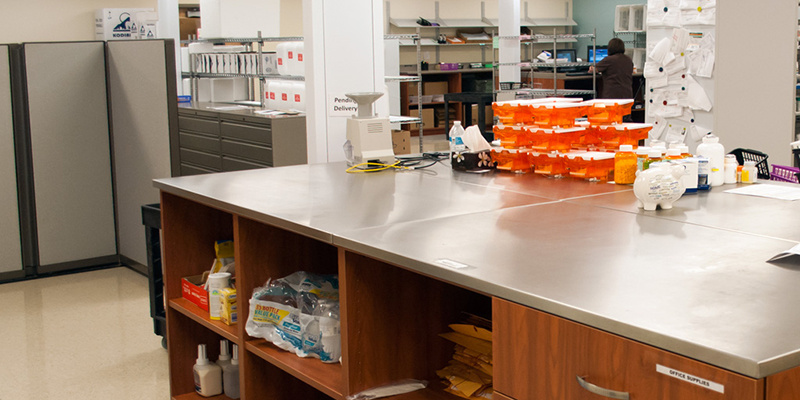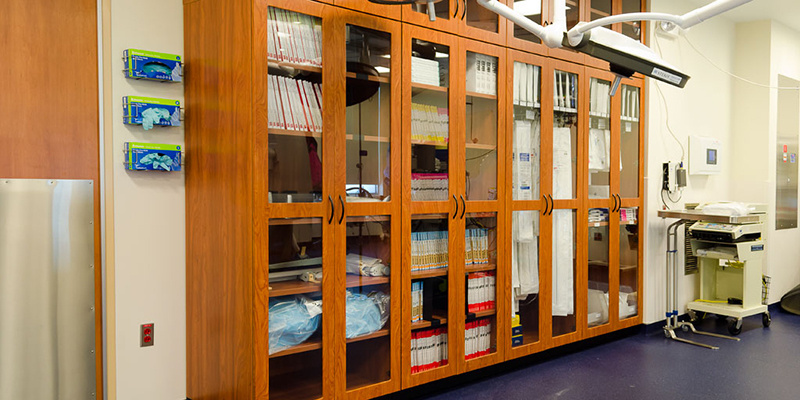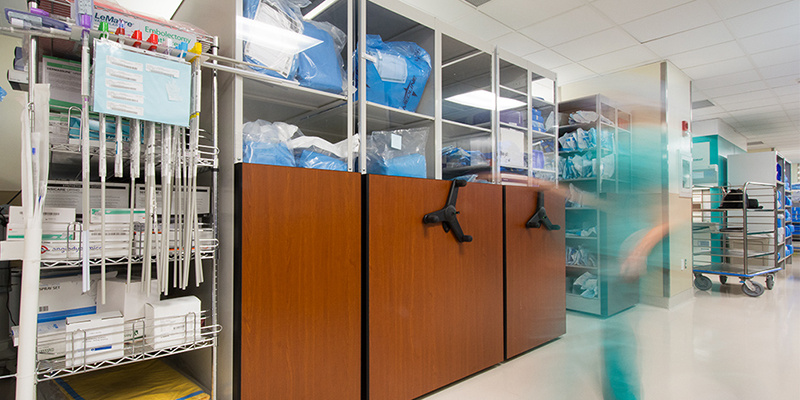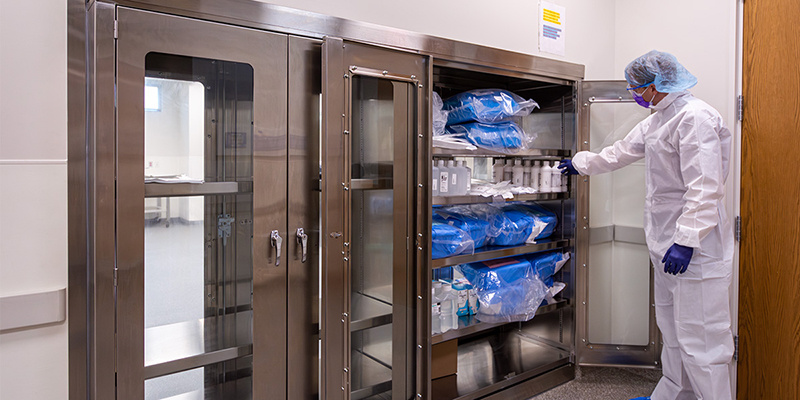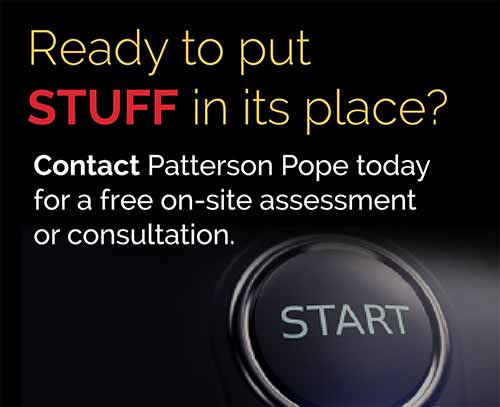Kristin Ormand has been with Patterson Pope for what feels like forever — in the best way. Over the years, she's worn a lot of hats, including more than a decade in sales. While she's worked with clients in just about every industry, healthcare holds a special place in her heart.
Kristin is all about the details, and in healthcare, the little things make a big difference. We caught up with her to hear her thoughts on medical storage and to dive into the trends, challenges, and opportunities for today's hospitals, clinics, and pharmacies.
Q: What special challenges does healthcare present?
A: Every facility operates differently, and what matters most can vary from one to the next. Of course, there are industry-wide standards everyone has to follow, like OSHA, JCAHO, or DHEC in South Carolina.
Take pharmacies, for example. There are strict codes and USP 797 standards for compounding that dictate how clean rooms should function. And those standards don't stay static — they've changed three or four times in the last 12 years or so. That means facilities usually have to make construction updates, especially when it comes to HVAC systems.
Q: And standards can change from hospital to hospital?
A: Absolutely. In the VA's operating rooms, the cabinets are stainless steel no matter what. But in other hospitals, the standards can vary widely. One OR might call for powder-coated steel with a solid surface top, and another hospital might need fully sealed laminate cabinets or a stainless steel top.

That's why it's so important to sit with clients and end-users and ask, "Okay, what are the standards here at your hospital?" Once we understand the parameters, we can handpick the best medical storage solution for their specific needs. It's all about tailoring the storage to fit the function.
Q: You've worked with a lot of different industries. What's unique about healthcare needs?
A: That's easy. The storage solutions we help implement in healthcare can, in an indirect way, affect patient health. It's the only industry where, at times, people's lives are at stake.
Sterile processing departments are a great example. An instrument tray can hold upwards of 40-some loose pieces. If that tray isn't properly stocked, there could be a mad scramble to find the specific instrument that a specific patient needs. That kind of chaos can impact a patient's outcome in the OR. It's the kind of scenario that doesn't happen every day, but it is a realistic possibility.
Q: So then how can healthcare facilities improve their storage efficiency?
A: There's a definite trend toward a "just in time" philosophy for materials. Many of our larger customers have contracts with medical equipment providers for daily deliveries. Facilities are only getting better at predicting what they're going to need when they're going to need it.

It's a shift driven by better data generation and analysis. Products like vertical carousels play a role here too — they help optimize space, track supplies, and keep things organized.
Q: Hasn't efficiency always been important?
A: Important? Yes. Enacted? Not so much. From my experience and the conversations I've had, it's clear that (at least from a medical storage perspective) more departments should work like a factory. They should avoid sitting on stuff that isn't used frequently.
That said, if you're talking to someone in sterile processing, you might hear them say, "We just have to have this in case of X." And that's fair, but facilities would benefit from working with someone who can help them understand what they'll need and how the process should work — a "factory guy," so to speak.
With a properly designed system, everything moves faster and runs smoother. Hospitals and medical facilities are constantly looking for ways to improve efficiency, and it's a fascinating shift to watch.
Q: So what should healthcare pros consider before starting a project?
A: Focus less on the clinical perspective and more on the workflow. If you get the workflow right, the clinical side will follow. It's essential to examine your processes — what's step one, step two, step three — and really examine how things flow.

Taking a holistic look at your processes can help make decision-making about storage solutions much easier. Usually, it's the space that determines the process or the idea that "this is the way we've always done it." But when you take a step back and reengineer without those biases, the results can be eye-opening.
There's almost always a better solution — one that helps you store more in less space, access vital items quickly, and support your workflows better.
Q: Are there any specific products you like to use?
A: I absolutely love the Rotomat from Hanel. It has a vertical design, which makes it a great way to take advantage of limited space. But what I love even more is how it helps with data.
When customers use the software that comes with it, they get so much valuable, usable information. They can track who's pulling an item, who's putting it back, how fast they can get it, and how often it's used — weekly, monthly, or annually. This kind of data lets customers accurately asses what they need more of and what they need less of.

It's a game changer for improving medical storage efficiency. That said, managing the data is key. Someone needs to review it, interpret it, and adjust processes accordingly. Getting end users to embrace that part might be the biggest challenge — but once they do, the impact is incredible.
Q: How have the healthcare industry’s needs changed over the years?
A: More and more, medical facilities are putting together task forces to really dig into their processes and figure out how to do things better. It's a shift that's been happening gradually, but it's exciting to see.

For us, it's a great opportunity to step in and work alongside these teams. Together, we can help departments run more efficiently — making them safer, leaner, and just better overall.
Q: Is there a "most asked question" in healthcare?
A: Clients are always the most interested in solving their facility's specific challenges. It's actually me who asks the "most asked question" in healthcare: "Can I see what you're doing now?"
Once I see their current setup and get a better understanding of how they're using what they have — and what they're hoping to achieve moving forward — we can have a really fruitful conversation. It's all about starting with their reality and building from there.
Q: What are the biggest “stuff” problems in healthcare?
A: Poor organization, hands down. And then there's the classic, "We've always done it this way" mindset.

From my perspective, the real challenge is figuring out if the person I'm working with is committed enough to make the decisions I know they need to make. This is a process, and it's really fun. I'm always out there trying to build new relationships. Hopefully, I'm laying the groundwork for future success.
Q: Do you have any final thoughts on the state of healthcare storage?
A: One thing I wish healthcare professionals understood is that no two solutions are the same. Every department has unique needs and should be looked at differently. There are a lot of things you can buy out of a catalog — but is it really the solution you need?
I'm not here to sell you a product. I'm here to provide a service and help create a comprehensive, tailored solution. The reality is, not every project will need Patterson Pope. But when you need us, you really need us. And when we're the right fit, we can really make a difference.
If your facility is ready to rethink medical storage and find solutions that truly work for you, reach out to one of our representatives today. Together, we'll design a system that supports your workflow, maximizes efficiency, and sets you up for long-term success.


